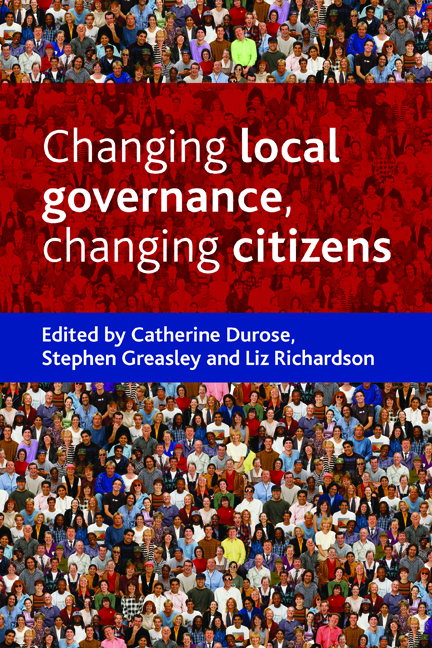Book contents
- Frontmatter
- Dedication
- Contents
- List of boxes and tables
- Acronyms
- Notes on contributors
- Acknowledgments
- Foreword
- Preface
- one Changing local governance, changing citizens: introduction
- two Citizen governance: where it came from, where it’s going
- three ‘Neighbourhood’: a site for policy action, governance … and empowerment?
- four Urban housing market restructuring and the recasting of neighbourhood governance and community
- five Citizen aspirations: women, ethnicity and housing
- six Can we promote cohesion through contact? Intergroup contact and the development of community cohesion
- seven New migrants, citizenship and local governance: ‘Poles’ apart?
- eight Citizens of faith in governance: opportunities, rationales and challenges
- nine Citizens’ reflections on behaviour change policies
- ten Every child’s voice matters?
- eleven e-citizenship: reconstructing the public online
- twelve Conclusion
- Index
five - Citizen aspirations: women, ethnicity and housing
Published online by Cambridge University Press: 16 July 2022
- Frontmatter
- Dedication
- Contents
- List of boxes and tables
- Acronyms
- Notes on contributors
- Acknowledgments
- Foreword
- Preface
- one Changing local governance, changing citizens: introduction
- two Citizen governance: where it came from, where it’s going
- three ‘Neighbourhood’: a site for policy action, governance … and empowerment?
- four Urban housing market restructuring and the recasting of neighbourhood governance and community
- five Citizen aspirations: women, ethnicity and housing
- six Can we promote cohesion through contact? Intergroup contact and the development of community cohesion
- seven New migrants, citizenship and local governance: ‘Poles’ apart?
- eight Citizens of faith in governance: opportunities, rationales and challenges
- nine Citizens’ reflections on behaviour change policies
- ten Every child’s voice matters?
- eleven e-citizenship: reconstructing the public online
- twelve Conclusion
- Index
Summary
Introduction
Housing is one of the key goods that citizens consume and which fundamentally affects their lives and well-being. The provision and supply of housing in the UK is largely market-led, but local governance institutions play a key role in shaping supply. Decisions about what sort of housing is provided, for whom and where, are being made by local governance actors. This chapter explores what and how data is collected in order to make those decisions, and questions whether this intelligence matches what citizens themselves want. What is at stake for governance and citizens is whether major investment in a critical aspect of people's lives – their homes and neighbourhoods – will actually give people what they want.
Housing policy is focused on increasing housing supply, improving existing neighbourhoods, managing community relations and increasing consumer choice. In order to deliver these policies effectively, it is more important than ever to understand how people make choices about where they live, who makes these choices and what those choices are for different groups of people. This chapter explores the extent to which local governance actors understand these choices and meet the needs of citizens – in particular, the needs of two ‘types’ of citizens, women and minority ethnic communities. It does this through an examination of local policy relating to housing and ethnically mixed neighbourhoods, and by drawing on empirical data from a recent study published by the Joseph Rowntree Foundation and the Chartered Institute of Housing (see Harries et al, 2008).
There is an underlying assumption made by institutions that there are marked differences in citizen aspirations along ethnic lines. Local governance actors concerned with equality and community cohesion bolster this assumption when developing strategies to address these concerns in relation to where people live. Local authorities have, for example, developed black and minority ethnic (BME) housing strategies that seek to meet culturally specific needs of minority households, with an emphasis on needs that differ from the ‘mainstream’. At the same time there is an increasingly explicit government agenda to create ethnically mixed neighbourhoods across the UK, evident in policy initiatives both at local and national level. This drive towards ethnically mixed neighbourhoods suggests that there is ethnic segregation, that this is bad and that there is a need to create more (ethnically) diverse communities in order to improve neighbourhoods and foster ‘community cohesion’.
- Type
- Chapter
- Information
- Changing Local Governance, Changing Citizens , pp. 71 - 90Publisher: Bristol University PressPrint publication year: 2009



